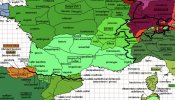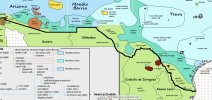Mutual comprension sp-fr is not so easy as phonetic barrier is big. But people in border areas do tend to speak the others language due to commercial interest. In most shops of San Jean de Luz, Hendaye Spanish is spoken. Not so realmin the spanish, where youth speak more English. In the basque region one could think that having a common native language in both sides of the border do things easier. Not so true, reality is complicated. France's hyper-centralist policy still does not officially recognise "regional languages", in our case, Euskera. This is terrible for the prestige of a language, it is associated with the way people talk in the village. In France, very few people speak it for this very reason, despite the success of the Ikastolak language immersion schools. This clashes with the reality of the Spanish part, where, despite the legal difficulties for total normalisation, a citizen of the Basque autonomous community or of the Basque-speaking areas of Navarre has the recognised right to communicate with the public administration (half of the time, this is true), to study at school, at university in Euskera or even to publish doctoral theses in Euskera. Specifically, in the province of Gipuzkoa, 50% of adults and 80% of teenagers speak Euskera (as their first or second language). It is difficult to find Basque speakers on the French Basque coast (many new residents each year from the Bordeaux and Paris areas). In the interior area, for example Ustaritz, Sara, Bigorri, SJPdP, it is easier to speak Basque. It could be a language of understanding on both sides of the border, but I fear that it is not in the political interest of both countries to promote it as a common language.























